.

Director: Mike Hodges
Screenwriters: Michael Allin, Lorenzo Semple Jr.
By Roderick Heath
It’s a little difficult to write a coherent piece on Mike Hodges’ cult classic Flash Gordon without descending into fetishising its variegated fragments of dazzling impression like a Gustav Klimt painting: Colour! Queen music! Ornella Muti’s thighs! Brian Blessed’s thighs! Today, the popular cinema culture feels an overwhelming need to validate and pump up the mythical seriousness of comic book fare, complete with epic-scaled special effects in which “believability” is a constant maxim. Look at the way Michael Bay tries to cloak his ludicrous Transformers movies with images of martial nobility and heavy-duty patriotism whilst his robots brawl in pseudo-realistic blurs of incoherent motion. Our age is a complete inversion of the camp, pop-art-inflected likes of the Batman TV series and films like Danger: Diabolik (1967) and Barbarella (1968). There’s some good reason for that inversion: campy, self-conscious superhero and comic book flicks eventually became embarrassing to their fans, because camp too often became a lazy creative crutch.
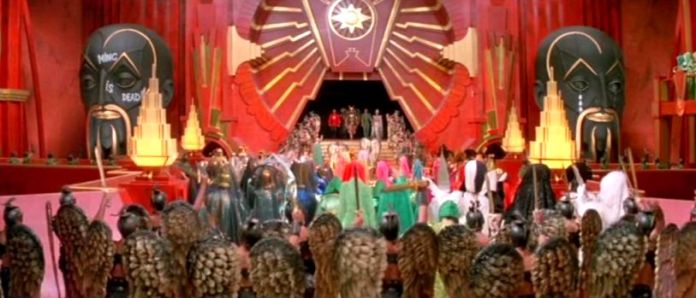
In 1980, Dino De Laurentiis, producer of Danger: Diabolik and Barbarella, and Lorenzo Semple Jr., occasional writer on Batman, collaborated on an adaptation of Alex Raymond’s Flash Gordon, the seminal ’30s Buck Rogers rip-off that became one of the most recognisable icons of juvenile derring-do, interspersed with fantastical landscapes and dollops of soft-core sexuality. De Laurentiis and Semple had already collaborated on their sorry sack of a King Kong (1976) remake, and the Italian maestro’s attempts to conquer Hollywood through science fiction and horror movies were mostly disastrous, often both aesthetically and financially. George Lucas developed his original Star Wars material because De Laurentiis had bought the rights to Flash Gordon before he could. After trying to interest several high-profile directors in giving their distinctive personal stamp on the material, including Federico Fellini and Nicholas Roeg, De Laurentiis finished up hiring perhaps the least likely candidate for such a project: British director Mike Hodges, most famous for his bone-crunching gangster film Get Carter (1971).
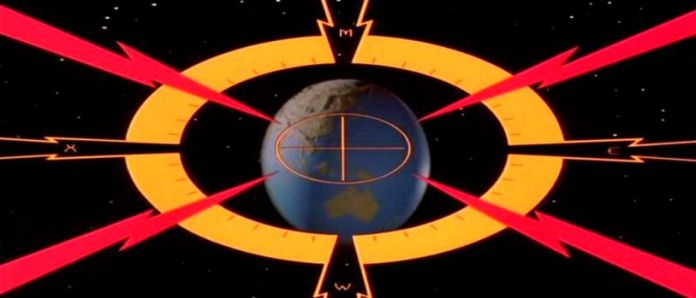
The jump between such cast-iron fare and the delirious psychedelia and playful action of Flash Gordon seems colossal, though Hodges’ previous film was a step in a science-fiction direction—an adaptation of Michael Crichton’s The Terminal Man (1973). Even more problematic was the fact that Hodges, working with De Laurentiis’ mostly Italian crew, essentially had to improvise everything but the dialogue and basic story from day to day during the shoot. Hodges’ Flash Gordon, which provided a sort of postdated antecedent and satiric mirror of Star Wars, nonetheless retains a rollicking verve and delicious sense of fun, as well as a genuinely rich evocation of those pop-art roots. It’s far better than Barbarella, and sustained by a remarkably sturdy sense of when to take the material seriously and when to send it up.

Flash (Sam J. Jones) is in this incarnation an American football champion on holiday in the off season. He meets travel agent Dale Arden (Melody Anderson) on a plane just when Earth is beset by showers of fiery meteorites that announce the campaign of terror begun by alien dictator Ming the Merciless (Max Von Sydow). The very opening of the film depicts Ming being presented with Earth as a suitable plaything and target for destruction by his vizier Klytus (Peter Wyngarde) to sate Ming’s boredom. The pilots of Flash and Dale’s plane are sucked out of the cockpit when it is punctured by a meteorite, forcing Flash to use his rudimentary flying skills to make an emergency landing.The plane crashes into the remote observatory/laboratory in which Dr. Hans Zarkov (Chaim Topol), a genius kicked out of NASA because of his much-derided fear of alien invasion, has built a homemade rocket ship. Zarkov is near-crazed by his determination to search for the alien threat, and needing a second passenger to help him operate the controls after his assistant Munson (William Hootkins) runs off, he kidnaps Flash and Dale by convincing them his ship is a telephone booth. After a tussle, they’re launched into space, sucked into a wormhole, and emerge on Mongo, Ming’s home planet, where they’re taken prisoner and presented to Ming’s court.
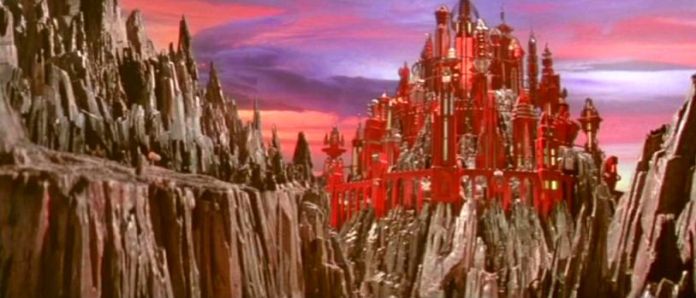
Hodges’ flashy visuals, with inestimable contributions by Danilo Donati’s wild production fancies and Gilbert Taylor’s terrific photography, present a vision of totalised style that suits this material perfectly. Hodges’ accounts of the film’s shooting reveal the vast difference between the kind of production De Laurentiis, Donati, and their crew were used to, compared with the oncoming age of Hollywood’s ruthlessly pedantic blockbuster infrastructure, as Donati hurled together gigantic sets for the hell of it and hired famous artists to work for weeks on background paintings, none of which could be used. This style of working perhaps explains why so many of De Laurentiis’ genre excursions finished up as giant messes; but Hodges seems to have had exactly the right sort of wit to make it all work for him.
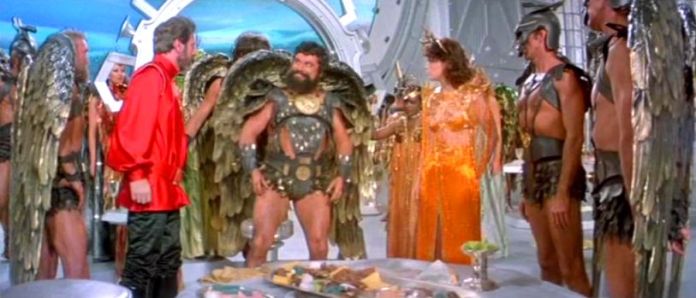
The opening credits, offering fleeting visions of Raymond’s strip flickering by in a pop-culture dream to the driving throb and declarative choruses of Queen’s theme song, give context for what follows in the same bold, Sunday comic colour and two-dimensional illustrative elegance as Raymond’s pictures. Ming’s kingdom is a candy-tint sprawl of fantastically attired aliens and settings, from the oddly delightful, much-victimised lizard-men who appear throughout, to the army of scantily dressed concubines, and the winged, jockstrap-clad Hawkmen led by Prince Vultan (Brian Blessed at his most spectacularly hambone). Jones, a minor hunk of beefcake whose greatest claim to fame before this was as a Playgirl centrefold, doesn’t display great acting chops, and yet, this makes him oddly perfect as Flash, who’s defined by his slightly dim, utterly innocent approach to life’s problems. “This guy’s a psycho!” he blurts when he witnesses Ming’s rough justice for the first time. He’s immediately plunged into a parade of cliffhangers and deadly situations. In perhaps the film’s most inspired coincidence of comedy and action, Flash starts a brawl with Ming’s henchmen, and, initially outmatched, he catches a ball-shaped ornament Zarkov tosses to him and immediately starts devastating them with his football prowess, with Dale giving pep-rally cheers. Klytus recognises the “barbaric game” and gives plays to the guards, while Zarkov finally accidentally knocks Flash out with a pass. Flash is sentenced to death in a gas chamber, whilst Dale is enslaved by Ming as a prospective bride. But Flash is saved by the conniving of Ming’s lusty daughter Aura (Ornella Muti), who arranges with one of her lovers, a doctor (Stanley Lebor), to help Flash survive the gas. She then spirits him away to the forest kingdom of Arboria, and begs another of her lovers, Prince Barin (Timothy Dalton), to shelter Flash.
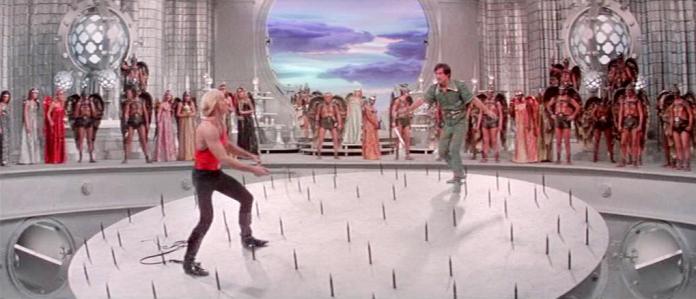
Hodges treads a tightrope throughout Flash Gordon and stays on it for the most part, never allowing the film to become too silly whilst keeping tongue in cheek all the time. It helps that he plays the film’s serial-like set-pieces seriously, including Flash’s being forced by Vultan to engage in a deadly test of manhood for the Arboreans by reaching into different cavities in a tree stump where a poisonous creature lives, and later his death-match with Barin on a moving disc out of which lethal spikes randomly protrude. Dale even gets in on the act, besting a bunch of Ming’s blind pig-men guards with kick-ass élan, yet with the witty little touch of her constantly pausing to move out of the way the ludicrously glam high heels she kicked off to do battle until she’s done and can put them on again. The special effects are a different proposition, an advancement on the tinny craft usually seen zipping about on wires with firecrackers in the the ’30s and ’40s serial versions of the strip, and yet still paying more than a wink to their cheesy glee, as hordes of Hawkmen dive through the clouds bouncing about on wires, and suspiciously phallic rockets zip through the hallucinogenic skies of Mongo and its moons.
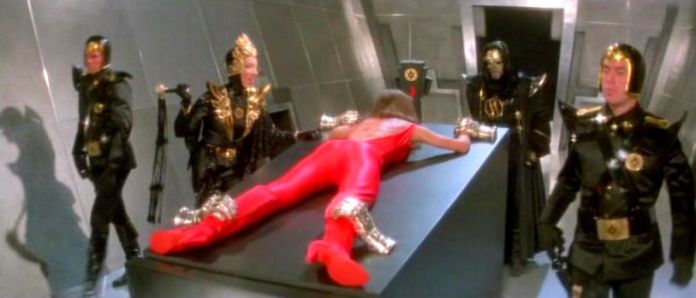
Hodges’ film came out eight years after Michael Benveniste and Howard Ziehm’s Flesh Gordon satirised the strip in a semi-pornographic, but startlingly accurate fashion, and some critics actually prefer that version. A not entirely dissimilar sense of the strip’s sexuality percolates more subtly throughout this one; after some surprise, Hodges admitted he had learnt just how strong the strip’s influence was on American friends’ early sexual fantasies, and pays some tribute to it, with Aura’s provocative horniness and the eventual S&M-accented torture of Flash and Aura. “We don’t like doing this at all!” claims spandex-clad bitch-queen General Kala (Mariangela Melato) in between lusty blows of a whip on Aura’s back; Klytus stops her with the even more insidious proposal: “Bring me the bore-worms!” Hodges even has famed playwright John Osbourne appear as a high priest whom he frames to look as if he’s masturbating, though he’s actually just engaged in a religious rite. A great pleasure of the film is that everyone seems to be in the right key of overlarge and funny, yet not excessive or mocking, performance. Von Sydow, relishing his first truly nonsensical role after two decades of suffering antiheroes and icy villains, makes a gloriously stylish, even sexy, but deeply psychopathic Ming, strutting through the proceedings with a concise physicality and arch attitude. Just as good is the mordant purr of Wyngarde’s masked Klytus. Muti’s overripe sexuality, practically a cult fetish in itself, neatly contrasts Anderson’s perfectly pitched turn as Dale—I have no idea why the only other film I’ve seen her in is Dead and Buried (1981)—and of course there’s a catfight between the pair. Dalton clearly laid his claim not only to his ill-fated, underrated turn as James Bond, but also his Errol Flynn-esque bad guy in The Rocketeer (1991) with his amazingly dashing performance as Barin, whose instant enmity for Flash is countered by Flash’s gentlemanliness, and he catches on to this whole Earthling decency thing.
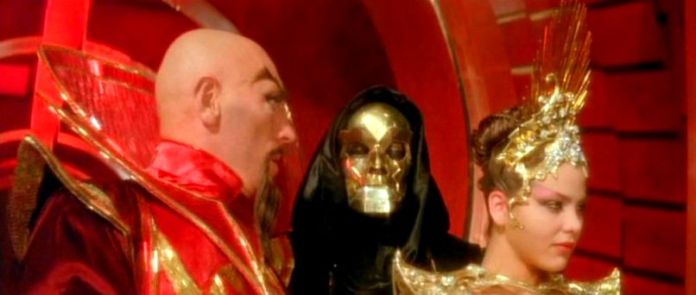
This Flash Gordon was misinterpreted as a spoof by some at the time of release, but it’s really a classic swashbuckler with a grand sense of humour about itself. It’s the film’s refusal to modernise its plot and visuals or cynically mock the values it embodies, even whilst being very funny about everything else, that finally make it more than colour and motion. Flash is a patently outdated figure, but like Richard Donner’s similarly strong Superman (1978), the disparity is shoved aside when Flash is stuck into a situation that requires precisely his kind of naïveté. Throughout the film, treated with an ironic glint but with a hint of enough substance to hold it together dramatically, is the spectacle of the human values Flash, Dale, and Zarkov retain that easily, constantly better the cruel, powerful, yet rather sloppy omnipotence of Ming and his followers. There’s a witty and affecting episode in which Klytus and Kala try to brainwash Zarkov, parsing through his memories back to his Jewish roots in Hitler’s Germany: “Now he showed promise,” Klytus purrs upon seeing the dictator. But Zarkov thwarts them by keeping a litany of human arts and sciences flowing through his mind. Flash’s example impresses Barin and also Vartan and his Hawkmen, who follow him into battle, and Flash, with his guileless purity, resists Ming’s offer to give him Earth to reign over. Ming’s attempt to marry Dale comes as circling spacecraft trail signs that read, “All creatures will make merry…Under pain of death,” and the High Priest (Philip Stone) has to amend his marriage vows for Ming: “Do you promise…not to blast her into space…ah, until such time as you grow weary of her?”
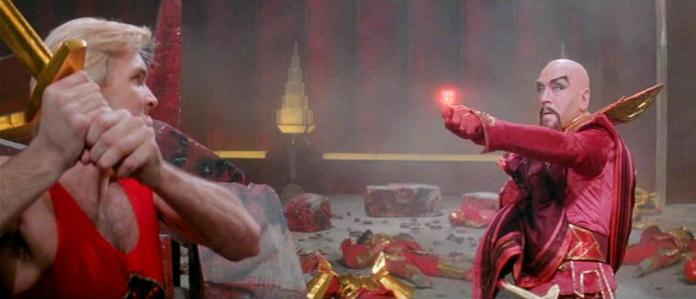
Late in the film, Hodges offers a battle sequence that strikes a sturdy balance between genuine spectacle and tacky absurdity, as Flash and Vartan entrap one of Ming’s spaceships and board in a sequence that suggests a mating of The Sea Hawk (1940), Wagnerian myth, and a Peter Pan pantomime. Flash makes a suicide drive into Ming’s defences to bring about a catastrophic explosion that will allow the conquest of his citadel, but Barin’s action within helps Flash make Ming see the point in an hilariously apt finale. Key to a lot of the film’s high-flying impact, particularly in this sequence, is the terrific score provided by Queen (all together now: Flash! Ahh-ahhh!), standing in some contrast to the band’s overblown contribution to Highlander (1986), and orchestrations by Howard Blake. The film’s final shot pays a winking tribute to the end of Terence Fisher’s Dracula (1958) as Ming’s hypnotic ring is all that’s left of his dissolved body, yet suggesting his survival: The End? asks the closing title, but no sequels were forthcoming. Which perhaps is just as well, as it’s hard to imagine how this film’s raucous invention could have been extended without descending into excess. But given how tedious some contemporary blockbuster cinema can be, it’s not hard to wish for an alternative dimension where Flash stills stands for every one of us.

Actor’s aside, the look was Alex Raymond inspired right down the line, I love that about this film. Sumptuous is rarely used nowadays, but this film had it in spades. This would be a great silent film, and the dialog could be reconstituted into Raymond’s own comic’s sensibilities. And Brian Blessed, holy crap, what a great performance – I watch it just to see his smile and laugh. Fun was abundant in this film, but it just barely edges out “Flesh Gordon” for camp. Great Review a fave of mine!
LikeLike
I actually assigned this film as part of the White Elephant Blogathon. I didn’t want to exert maximum pain, and picked this film because it is entertaining. But in my opinion, despite the sumptuous presentation and fun set pieces, it’s not really very good. Still, camp was so much better back before it became so self-aware and ironic. Agreed that Jones is great for this role, but I still have many fond memories of the serial, and Buster Crabbe was no dope.
LikeLike
Queen’s sensibility was perfect for the soundtrack as well. Knowingly hammy at times, but played straight. The theme song and the opening credits are excellent.
LikeLike
Damn, I need to see this again. It’s been an awfully long time since I last did (possibly not since the late 80s) and I haven’t even given the film any thought, really, since then. But this has inspired me to track it down. I want to see Flesh Gordon, too; I’ve got the trailer for that on a DVD and want to see if the film lives up to that. Imagine Brian Blessed in Flesh Gordon… actually, maybe we shouldn’t.
LikeLike
von Sydow’s Ming is a perfect visual representation, and his dialog is much closer to Raymond’s strip in general. That was the film’s drawback for me, tho, the script wasn’t the equal of the visuals, and imagine Buster Crabbe of the right age in this one instead of Jones, that woulda been wonderful. It had a lot of touchstones to the serials, both Flash and Buck Rogers, but Raymond’s Flash strip was much more than a rip-off, it was a huge improvement artistically, with stronger story lines, and was a real work of art – in the serials it was the other way around, Buck used the leftover sets and costumes from the Flash serials, and of course, Buster Crabbe as well. Flash owed more to Edgar Rice Burroughs space romances, and it shows in this film as well.
Flesh Gordon was actually a nice homage in a lot of ways, the names were changed to protect the un-innocent.
LikeLike
Mare, I can’t agree with you. This is an excellent film, funny and dynamic; I was completely caught up in it. I’d seen bits of the film before, and each time it seemed awkward without context, but watched from the start and in the proper mood, the success with which it sustains its style is quite something. I’d also disagree inasmuch as I don’t think camp comes much more ironic and self-conscious as this, and technically the moment something knows it’s camp it is no longer camp; perhaps it gets louder, sillier, more aggressively clueless (a la Joel Schumacher’s Batman movies). As Vanwall says, there are few comic book adaptations that recreate the aesthetic of their source material with the rigour of this film. And Pinko Punko, you nailed it. Queen’s music often walked just such a line between straight rock-out and glam satire.
Brian Blessed in Flesh Gordon, JR?…Oh, my mind’s eyes!
LikeLike
I wouldn’t mind seeing it again through new eyes. As I said, I did think it was entertaining. I’ll see if I can track a copy down.
LikeLike
This is a fun film and I remember seeing it when it was first released and loved every minute of it. The bright, pop art color scheme and game cast really make it a comic book movie extraordinare – tons of fun more than the boring excesses of Bay’s TRANSFORMER films which take themselves waaaay too seriously. Hodges captured just the right tone as you point out. Man, what an odd film this is but in a good way that reminds one how they really don’t make films like this anymore.
LikeLike
I see we agree absolutely, JD. We’ll need to think of something to disagree about.
LikeLike
Gordon’s alive!
LikeLike
He’ll save every one of us!
LikeLike
Fantastic piece, Rod. Reassuring to know I’m not the only hepcat who loves Flash Gordon. I’ll also declare that the De Laurentiis version of King Kong remains my favorite of the three Kongs — I don’t care what anyone else says. Maybe watching them for the first time as a kid had something to do with that.
I really don’t know what “camp” means. If you didn’t like the movie, it’s “camp”. If you did like it, it’s just a good movie. Flash Gordon isn’t meant to be a statement on humanity or what not, but it sure is fun. Brian May’s guitar work on the soundtrack always gets me in the mood to see this crazy ass scifi epic again.
LikeLike
Camp these days seems to mean the opposite of the “whoa, that’s kinda deep” reaction Christopher Nolan specialises in ripping from the fanboys. Glad you liked this piece Joe, but oh, man, do I have to disagree about the ’76 King Kong. That was the first version I saw as a kid too and I find it barely watchable. In any event, yes, Brian May’s work is the quintessence of rocking out.
LikeLike
Congrats on the best review of Flash Gordon I’ve ever read. I watched it again the other night and hugely enjoyed it. I’ve seen so many reviews that describe it as camp and that really bugs me because it’s not a camp movie at all. You’re absolutely right when you say that all concerned play ‘overlarge and funny’ but that’s not camp and I wish more people would recognise that. And isn’t the kinky vibe of the film striking? When Lucas made the original Star Wars he seemed to do everything possible – from dress, hairstyle and behaviour – to make Princess Leia as asexual a presence as possible, despite the fact that scantily clad, erotic females were a key staple of the genre he was borrowing so liberally from. But in Flash Gordon that quality is everywhere. Perhaps that’s the Italians for you, or maybe just the Europeans generally! Anyway I think the film stands up exceptionally well. I originally saw it in 1980 and enjoyed it then but the passage of time seems to have made FG’s qualities stand out in even sharper relief. Anyway thanks for the review.
LikeLike